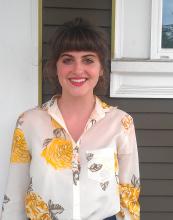My research seeks to include the histories of slavery and colonialism in the critical conversation that has arisen around the theories of “biopolitics” advanced by Michel Foucault and Giorgio Agamben. In constructing a framework of biopolitical theory, I also bring in work by Hannah Arendt and Walter Benjamin, both of whom, though not traditionally understood to be biopolitical thinkers, were involved with similar questions regarding the possibility of a modern politics that designated life itself as the primary concern of the State. I approach this project through a reading of two fictional representations of slavery and colonialism: Hermann Melville’s Benito Cereno and Joseph Conrad’s Heart of Darkness. Taking as a central point of inquiry Foucault’s discussion of power relations that are “both intentional and non-subjective,” I develop the term “intent” to characterize the paradoxical exercise of a biopower which takes as its end the furthering of life but employs as its means the destruction of entire populations. To theorize how Benito Cereno and Heart of Darkness expose the movement of intent, which has definite direction but could not be said to derive from a distinct causal agent, I apply Mikhail Bakhtin’s notion of the literary carnival. My analysis seeks to biopoliticize Bakhtin’s concept so that, in addition to a destabilization of life’s hierarchical social relations, the two novels can be seen as enacting a disruption of life’s regularization under biopolitics. I argue that Benito Cereno and Heart of Darkness can be read as models of “biopolitical carnival,” and relate them through a discussion of the micro-manifestation of intent at the level of narrative and the macro-manifestation of intent in the form of a distinct politics. The biopolitical carnival represents, in my work, both the indispensible contribution of the literary text to envisioning biopolitical intent and the expanded historical scope of theories of biopolitics.
BA in English: Language and Literature, 2014
Cum Laude
UW English Department Honors
Honors & Awards:
- Mary Gates Research Scholarship, 2013-14
- Annual Dean's List
Conferences:
- “Human Labor, Divine Vision, and Apocalypse in William Blake’s The Four Zoas, Milton, and Jerusalem,” Comparative Literature Undergraduate Research Conference, University of California, Berkeley, May 2014.
- “Counter Histories in Günter Grass’ The Tin Drum and Walter Benjamin’s Berlin Childhood Around 1900,” UW Undergraduate Research Symposium, May 2014.
- “Disjunctive Symmetry: Duality and Resistance in The Tin Drum,” Northwest Undergraduate Conference on Literature, University of Portland, April 2014.
